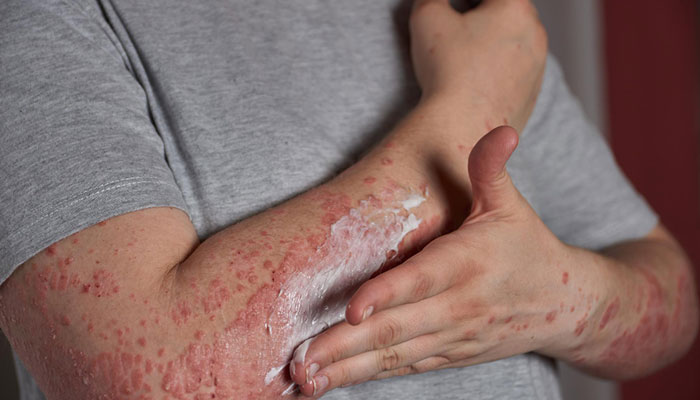Introduction
Psoriasis is an auto-immune disease characterized by a rapid accumulation of skin cells. This accumulation of cells causes scaling on the surface of the skin.
Normally, skin cells begin to develop in deep layers of the skin and gradually rise to the surface, where they eventually fall off. The average skin cycle is one month. However, in individuals suffering from psoriasis, the skin production process may take as little as a few days. This rapid rate of cell production results in an overproduction of skin cells, which in turn leads to the accumulation of skin cells.
Signs and Symptoms of Psoriasis
- Patches of raised, inflamed skin that appear reddish or purple
- Whitish-silver scales or plaques on skin patches
- Dry skin that cracks and bleeds
- Sore skin around the patches
- Burning and itching sensation around the patches
- Painful, swollen joints
Causes of Psoriasis
Psoriasis is a condition caused by an overactive immune system leading to skin inflammation.
Understanding Psoriasis in Ayurveda
Ayurveda attributes psoriasis to an imbalance of the Vata and Kapha doshas, leading to toxin buildup and impurities in the blood. This imbalance may result from dietary habits, stress, and genetic factors.
Treatment and Management
The treatment of psoriasis typically involves topical corticosteroids, phototherapy, and medications. Lifestyle modifications, including moisturizers and avoiding triggers, can also help manage symptoms.
Care offered by SGP’s PSA has been demonstrated to be effective in alleviating symptoms and enhancing the quality of life for patients with psoriasis. The primary focus of care delivered by the PSA is to manage symptoms, address emotional and psychological distress, and improve overall comfort.
FAQs about Psoriasis
-
Psoriasis is diagnosed through a physical examination of skin lesions, medical history, and sometimes skin biopsy to confirm characteristic skin changes, such as red, scaly patches.
-
Different types of psoriasis include:
- Plaque Psoriasis: This is the most prevalent form of psoriasis, and it typically manifests in the form of raised, red patches of skin.
- Guttate Psoriasis: This condition is more prevalent in children and is characterized by small, raised, red patches on the skin.
- Pustular Psoriasis: In this form of psoriasis, small blisters filled with pus are spread throughout the body or only on the palms, feet, and other small areas.
- Inverse Psoriasis: This manifests in the form of reddish, smooth, inflamed skin patches that are painful and itchy.
- Erythrodermic Psoriasis: This is the least prevalent form of psoriasis, but the most severe. It is characterized by intense skin inflammation and the shedding of multiple layers of skin.
-
No, psoriasis is not a contagious disease. The scaly patches caused by psoriasis do not spread to other individuals.
-
There is no permanent cure for psoriasis. However, it is possible to improve symptoms through the use of creams, moisturizers, or medications prescribed by a healthcare provider. Furthermore, maintaining overall health will also contribute to the improvement of symptoms.
-
Fatty and processed foods can lead to an increase in the inflammation of fat tissue. Chronic inflammation of fat tissue significantly increases the risk of developing psoriasis.






